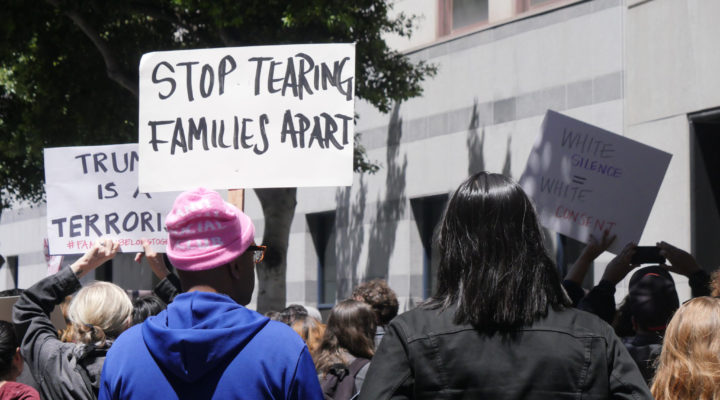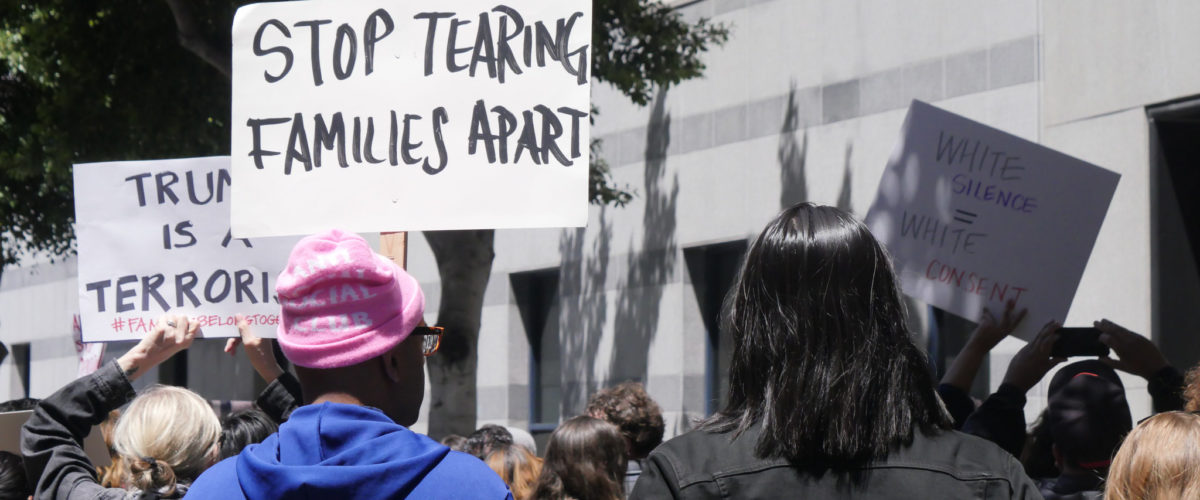Public outrage over President Donald Trump’s zero-tolerance immigration policy has given way this week to controversial Supreme Court rulings, including one upholding the president’s Muslim-focused travel ban.
But religious and other non-profit groups that serve immigrants have not taken their eyes off the ball. They are preparing for the next chapter in advocacy to address what they see as injustice and havoc caused by the administration’s forced separation of children from immigrant parents.
And those involved in such efforts say the work must be done not only at the border but also in communities across the nation and in Washington D.C.
Anger about the zero-tolerance policy has subsided to a degree since Trump signed a presidential order last week apparently halting the practice of forcibly separating children from parents trying to slip across the U.S. border from Mexico, and even for those legally applying for asylum. But thousands of detained children have yet to be reunited with their families.
However, the federal government has sent mixed signals about the status of the policy and, with so many reunions yet to happen, advocacy groups have their work cut out for them.
Grassroots effort evolving
There is also hope that the outrage sparked by images of children being ripped from their parents’ arms by Customs agents will inspire the financial giving and political will needed to campaign for systemic improvements to American immigration laws.
“What I am hoping is that this crisis we just witnessed creates a moment to get very serious about comprehensive immigration reform,” said Stephen Reeves, associate coordinator of partnerships and advocacy for the Cooperative Baptist Fellowship.

Stephen Reeves
“Terrible as this tragedy was, maybe it’s awakened folks to the reality of our broken immigration system,” said Reeves, whose responsibilities include leading the advocacy action team CBF created last year to serve immigrant and refugee communities.
The Fellowship has long been active in these issues, including through field personnel and partnering with organizations in direct ministry with refugees and immigrants. A CBF subsidiary hosted a vigil on Sunday outside a migrant child care center in Brownsville, Texas, the nation’s largest such facility.
But more action is coming.
Reeves said churches, ministers, lay persons and field personnel involved with the CBF action team are currently planning actions designed to heighten the visibility of immigrants and their needs.
In 2017, the focus was on Deferred Action for Childhood Arrivals, known also known as DACA, and on the so-called Dreamers it protected. The Trump administration sought to kill the program, but it continues as several lawsuits wind their way through the courts, according to the American Immigration Council.
The focus of CBF organizing efforts will now widen to include the children and families along the border, Reeves said. The idea is to encourage individuals and congregations to become leaders in the movement.
“We are going to be helping folks know how they can be advocates for that,” Reeves said.
‘We will be watching’
CBF will not be alone. Religious groups across the spectrum are calling for further protests of the president’s immigration policies and urging members to prepare for more action, including protests and lobbying Congress.
The Catholic Legal Immigration Network issued a statement June 20 condemning U.S. immigration policy and warning that the battle isn’t over yet.
The executive order Trump signed June 20, billed as ending the administration’s family separation policy, “merely pays lip service” to Americans’ concerns about the practice, the organization said.
“We will be watching to see whether the administration follows the law concerning how long it may keep families in detention,” Jeanne Atkinson, executive director of the network, said in the news release.
Meanwhile, continuing action is needed to address the thousands of youth already separated from families who have no idea where their children are, the network said. Atkinson added that vigilance also is needed to combat the administration’s other anti-immigrant efforts.
“Ending DACA; cutting of Temporary Protected Status for many countries; the Muslim travel ban; reducing eligibility for asylum; slashing the number of refugees admitted; conducting workplace raids; and making every undocumented immigrant ‘a priority’ for deportation will continue to break apart families and keep them apart,” she said in the release.
Other groups – ranging from the Buddhists, Presbyterians, Mormons and Methodists – are calling for the compassionate treatment of immigrants and urging members to take action when and where possible.
Faith groups in some cases also are using the zero-tolerance policy debate as a learning opportunity.
Methodists were encouraged recently to donate money, contact elected officials, attend rallies and vigils, volunteer and “teach and extend empathy” to immigrants, according to a June 21 statement from the United Methodist Church.
Providing tools for advocacy
A not-for-profit law firm in Waco, Texas, that represents immigrants and others on the margins of society said it’s developing strategy to handle the zero-tolerance fallout.
“We don’t have asylum clients or connections to these clients yet,” said Kent McKeever, managing attorney and partner of Greater Waco Legal Services.

Kent McKeever
But the emotional impact of the separations is being felt locally, McKeever told Baptist News Global via Facebook Messenger.
“What I have seen is that it exacerbates the fear and anxiety among all immigrants,” said McKeever, a member at Seventh and James Baptist Church, a CBF congregation in Waco.
That fear hits them on a deeper level and attacks their personhood and dignity.
“We are also seeing an increase in all immigration enforcement that threatens to separate other immigrants from their families,” McKeever said. “The whole system is cruel and inhumane.”
In response, the firm is seeking to add a full-time immigration attorney in the next three to six months. Other goals include offering legal workshops and consultations for immigrants and partnering with other groups working for immigrant rights in the community.
“Mostly, I think more and more immigrants need access to affordable, competent, compassionate legal representation,” he said.
Reeves said another need is a grassroots movement of congregations, ministers and lay people to provide consistent, long-term advocacy for immigrant children and their families.
CBF’s role will be to serve as a hub of information and connections between individuals and groups, he said.
“These are the tools they need to be effective advocates.”
Zero-tolerance has pumped fresh motivation into the effort for compassionate treatment of immigrants, he added.
“We are going to be helping folks know how to be advocates for that,” he said.


